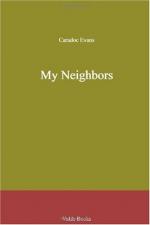THE WELSH PEOPLE
Our God is a big man: a tall man much higher than the highest chapel in Wales and broader than the broadest chapel. For the promised day that He comes to deliver us a sermon we shall have made a hole in the roof and taken down a wall. Our God has a long, white beard, and he is not unlike the Father Christmas of picture-books. Often he lies on his stomach on Heaven’s floor, an eye at one of his myriads of peepholes, watching that we keep his laws. Our God wears a frock coat, a starched linen collar and black necktie, and a silk hat, and on the Sabbath he preaches to the congregation of Heaven.
Heaven is a Welsh chapel; but its pulpit is of gold, and its walls, pews, floor, roof, harmonium, and its clock—which marks the days of the month as well as the hours of the day—are of glass. The inhabitants are clothed in the white shirts in which they were buried and in which they arose at the Call; and the language of God and his angels and of the Company of Prophets is Welsh, that being the language spoken in the Garden of Eden and by Jacob, Moses, Abraham, and Elijah.
Wales is Heaven on earth, and every Welsh chapel is a little Heaven; and God has favored us greatly by choosing to rule over us preachers who are fashioned in his likeness and who are without spot or blemish.
Every Welsh child knows that the preacher is next to God; “I am the Big Man’s photograph,” the preacher shouts; and the child is brought up in the fear of the preacher.
Jealous of his trust, the preacher has made rules for the salvation of our bodies and souls. Temptations such as art, drama, dancing, and the study of folklore he has removed from our way. Those are vanities, which make men puffed up and vainglorious; and they are unsavory in the nostrils of the Big Man. And look you, the preacher asks, do they not cost money? Are they not time wasters? The capel needs your money, boys bach, that the light—the grand, religious light—shall shine in the pulpit.
That is the lamp which burns throughout Wales. It keeps our feet from Church door and public house, and it guides us to the polling booth where we record our votes as the preacher has instructed us. Be the season never so hard and be men and women never so hungry, its flame does not wane and the oil in its vessel is not low.
White cabbages and new potatoes, eggs and measures of corn, milk and butter and money we give to the preacher. We trim our few acres until our shoulders are crutched and the soil is in the crevices of our flesh that his estate shall be a glory unto God. We make for him a house which is as a mansion set amid hovels and for the building thereof the widow must set aside portions of her weekly old age pension. These things and many more we do, for forgiveness of sin is obtained by sacrifice. Such folk as hold back their offerings have their names proclaimed in the pulpit.




